IOS Eleventh Shah Waliullah Award to Maulana Syed Mohammad Rabey Hasani Nadwi
August 1, 2015 at Faculty of Engineering and Technology Auditorium, Jamia Millia Islamia, New Delhi
Organised by Institute of Objective Studies, New Delhi
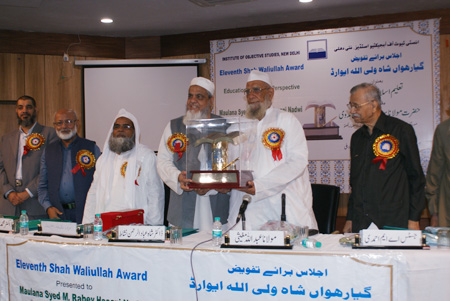
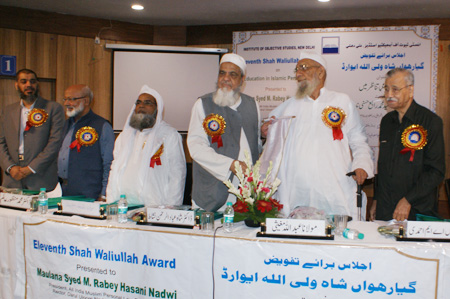 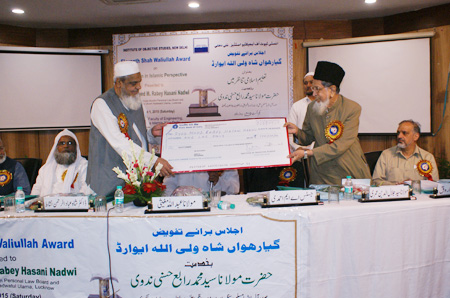
The eleventh Shah Waliullah Award “on Education in Islamic Perspective,” was presented at a glittering ceremony organised by the Institute of Objective Studies at the Faculty of Engineering and Technology Auditorium, Jamia Millia Islamia here on August 1, 2015. The award was received by Dr. Shah Ebadur Rehman Nishat in the absence of the awardee, Maulana Syed Mohammad Rabey Hasani Nadvi, President, All India Personal Law Board and Rector, the world-famous Islamic University, Darul Uloom Nadwatul Ulema, Lucknow. Maulana Rabey could not make it to the function on account of ill-health. While the ex-Chief Justice of India, Mr. Justice A.M. Ahmadi handed the cheque of one lakh rupees and the scroll, Maulana Abdullah Mughesi, President of the All India Milli Council, presented the memento to him.
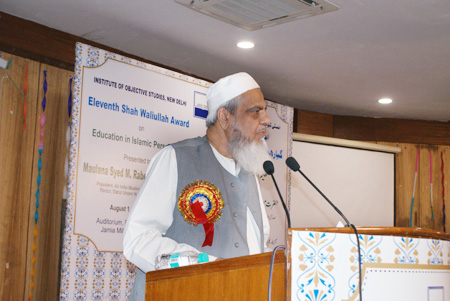
Dr. Nishat, who deputised for Maulana Rabey read out a message from him. In his message, the Maulana expressed his gratitude to the IOS for shortlisting him as a recipient of the eleventh Shah Waliullah Award. He noted that the topic for the current year’s award was relevant as the Muslims had achieved excellence in the realm of knowledge by following Islamic teachings in letter and spirit during a period extending to about one thousand years, the impact of which was worthy of emulation by others. He urged Muslims to understand the value of education in Islamic perspective. He remarked that the holy Quran mandated seeking real knowledge, which came through observation as well as experience.
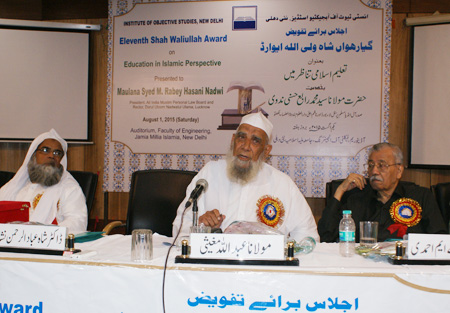
In his presidential remarks, Maulana Abdullah Mughesi said that the contribution of Shah Waliullah was not bound by time. The movement he started to acquaint the community with the Quran was equally relevant today so far as the guidance of the Quran and the Hadith was concerned to seek solution to present day’s problems. He called for paying special attention to the popularisation of the teachings of the Quran.
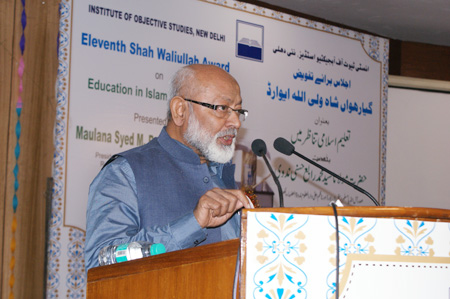
Highlighting the purpose of the institution of the award, the Chairman of the IOS, Dr Mohammad Manzoor Alam said that it was aimed at establishing a connect with the new generation in terms of cultural heritage as a race that was unaware of its legacy could not progress. As the entire scholarship of Shah Waliullah was derived from the Quran, the IOS deemed it fit to prepare 150 small booklets on important topics in the light of the Quran and Hadith. Besides, the project included 25 booklets that addressed the objections raised by non-Muslims and other issues of the contemporary world. He informed that these books were planned to be published in 17 different languages. The entire work on the Quran and Hadith would be compiled in two volumes with references. In addition, preparations were afoot to bring out a book on the contribution of Muslims, particularly Indian Muslims, in different fileds of life during the last 1400 years.
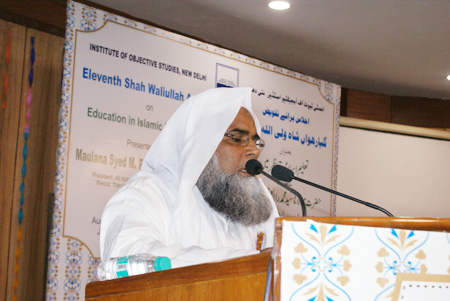
The General Secretary, Islamic Fiqh Academy (IFA), Maulana Khalid Saifullah Rehmani, observed that a closer look at the works of Shah Waliullah and the theory he propounded revealed that three distinct inferences could be deduced from them. These were (1) he established the relationship of the Ummah with the Quran and Hadith (2) Islam was imbued with modern knowledge, and (3) he stood for a balanced scholarship. He emphasised that all these three things were necessary to attain excellence.
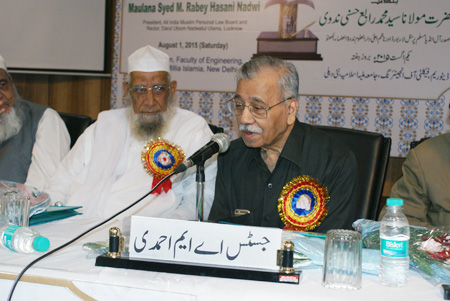
Mr. Justice A.M. Ahmadi held that education was a must for Muslims, saying that education led to empowerment and empowerment could be used for progress. It pained him to see that children who should be in schools, were roaming on roads purposelessly.
He said that since education had been made free for children in the age-group of 6-14, parents should make it sure that their wards went to schools. He went to the extent of saying that the parents who failed to send their children to school should be punished.
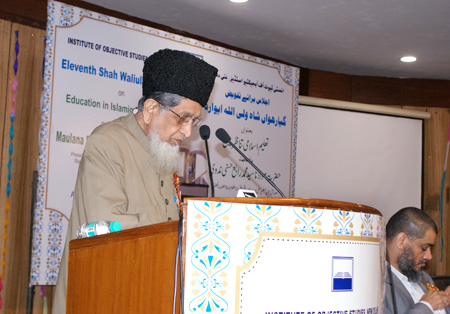
The President of the Jamaat Islami-i-Hind, Maulana Syed Jalaluddin Umri, explained the contest in which the Quranic commandment of ‘Iqra’ was revealed. He said that the Quran expressly commanded to read in the name of Allah. He maintained that education which was not imparted in the name of Allah was an exercise in futility. The Chairman of Tasmia Education Society, Syed Farooq, while referring to the life of the Prophet (SW) in the context of education said that his life was worth emulating for us. He was the finest businessman and his way of life was derived from the Quran.
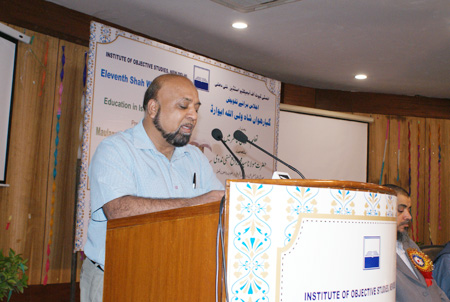
Earlier, the Member-Secretary of the Board administering the Award and Finance Secretary, IOS, Prof. Ishtiyaque Danish, in his introductory remarks dwelt on the selection process of the award. He said that Shah Waliullah wrote 22 books in Arabic. He also translated the Quran into Persian which was later translated into Urdu by his son, Shah Abdul Aziz. He informed that the theme of the 12th Shah Waliullah award would be “Media, Society and Indian Muslims.”
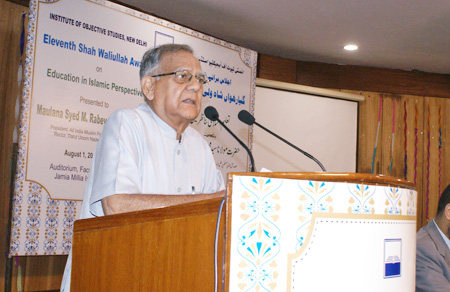
Highlighting the activities of the IOS, its Secretary General, Prof. ZM Khan said that topics for research were decided by different committees of the Institute. The IOS was now focusing on translation of its works in regional languages. Five chapters of the Institute were working on the aspirations of the local people. He said that demands for conferences, seminars and discussions were pouring in from different parts of the country. He informed that efforts were being made to open six centres in different areas to study the plight of the marginalised sections of society. Dr. Shah Ebadur Rehman called for critical analysis of today’s problems and their comparison with the problems of the previous centuries.
While the citation was read out by SM Shafiq, a profile of Maulana Rabey Hasani Nadwi was presented by senior Urdu Journalist and representative of the Voice of America Urdu Service, Suhail Anjum. Two young research scholars, Mohammad Kifayatullah and Ms. Najmus Sahar were jointly presented a cheque of Rs. 25, 000 as Shah Waliullah Award for the best essays on the occasion.
The function began with the recitation of a Quranic verse by Mohd. Athar Husain Nadwi. Arabic scholar, Dr Nakhat Husain Nadwi conducted the proceedings.
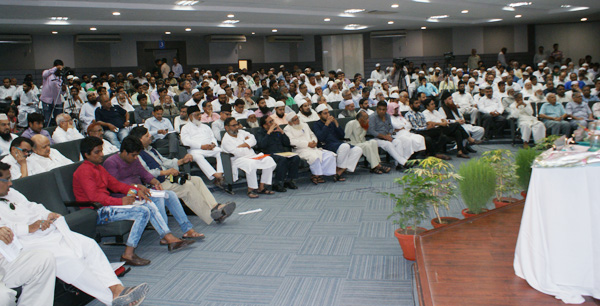
The function was attended by Khalid Abdullah Assarihi from the Kingdom of Saudi Arabia, Vice-Chairman of the IOS, Prof. Rifaqat Ali Khan, Prof. Afzal Wani, Dr. Syed Qasim Rasool, Engineer, Mohd. Salim, Mohd. Ahmad, Abdul Wahab Khilji and Kamal Faruqui, besides a number of teachers, research scholars and students from Delhi University, Jawaharlal Nehru University, Jamia Hamdard and the Jamia Millia Islamia.
|